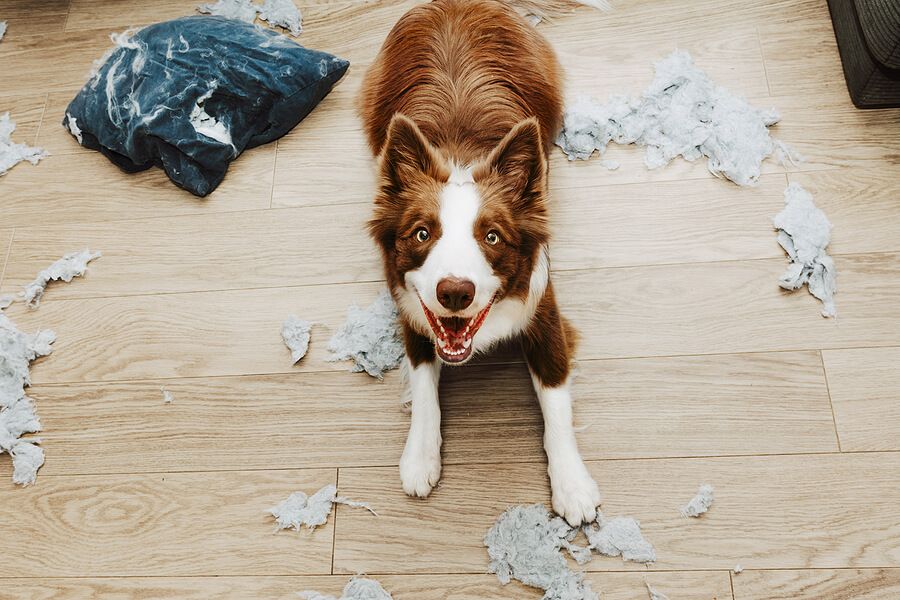Managing Separation Anxiety in Dogs: Tips for a Smooth Transition
As the COVID-19 pandemic worsened, people were forced to work remotely, making them spend the better part of their day at home with their dogs, a beautiful way to cuddle and bond with their pets. However, separation anxiety started as restrictions were eased, and people began leaving their houses more often. This is a general issue among dogs, even puppies, that can cause distress to the dog and its owner, and if not diagnosed early and appropriately treated, it can damage the dog.

Do you know how to prevent separation anxiety in puppies? The key is slowly building up your puppy's time alone in training. Then, whenever you leave them alone, ensure they have been well-exercised and have had the opportunity to go to the toilet. For some puppies, a small meal may help, making them feel more relaxed and sleepy.
In this blog, we'll explore the causes of separation anxiety, the signs of separation anxiety in dogs, and the different ways you can help prevent and manage it.
What is separation anxiety in dogs?
Separation anxiety in dogs is a behavioral condition caused by extreme distress and anxiety when the dog is separated from their owner or a loved one. Dogs are characterized as social animals and, as such, can form a unique bond or depend solely on their owner. A dog suffering from separation anxiety will likely show behavioral and physiological signs of distress, including vocalization, destruction, house soiling, and, more importantly, panic about being left alone. Some dogs show obvious signs of separation anxiety, but others don't, meaning many cases are undetected.
Signs of separation anxiety in dogs
Here are some common signs of separation anxiety in dogs;
Trembling,
Pacing
Excessive salivation.
Self-injury (e.g., symptoms of excessive paw licking or tail biting)
Repetitive behavior (circling, pacing, barking)
Vomiting.
Vocalizing
how to deal with separation anxiety in dogs
Inappropriate defecating
Drooling
Not eating (meals, treats, or engaging with food toys) when you're out.
How to prevent separation anxiety in dogs
Here are some ways how to deal with separation anxiety in dogs;
1. Don't leave your dogs alone; one of the biggest challenges faced in separation anxiety is that once the process begins, it is essential not to leave the dog alone. Practice leaving and returning in short periods to get the dog used to the idea that you will always come back, and if you can't be present at all times, you can seek for help from t a neighbor, friend, family member, dog walker, or daycare to help during the training process.
2. Leave Interactive Toys: Provide your dog with toys that can keep them entertained while you're away. Dogs with mild separation intolerance can also learn to enjoy the comfort of getting a treat-stuffed goody when their favorite person leaves the house for the day like. Puzzle, chew, or treat-dispensing toys can help distract them from your absence.
3. Create a Safe Space: Designate a specific area in your home, such as a crate or a cool corner, where your dog can relax and feel secure and comfortable when you're not around. It will help them relax and feel that alone time is a positive experience. If you have got a puppy, begin with a short period and increase the time slowly as time goes on.
4. Schedule Time for Play and Exercise; Most dogs benefit more from increased exercise, especially dogs suffering from a more significant form of separation anxiety, also known as separation intolerance. Working out your dog's brain and body helps the dog to settle during your absence hence schedule a particular period to exercise and play for your dog daily, as this will also help improve good behavior for your dog. Additionally, taking your dog for a walk or playing an interactive game with your dog before leaving the house is another step. After exercise, pets are usually tired and ready to sleep, which creates the perfect opportunity for you to go.
Caring for Your Canine Companion
If your dog is experiencing separation anxiety, you don't need to blame yourself or feel depressed about it, as this is a common issue with dogs. So be kind to yourself and find the nearest veterinarian office close or contact us at Forever Pets. We provide the highest extensive series of preventive care that is affordable and available for your four-legged human. Our veterinary services are tailored to your pet's health, from our wellness plans to exams. Reach out to us today.


